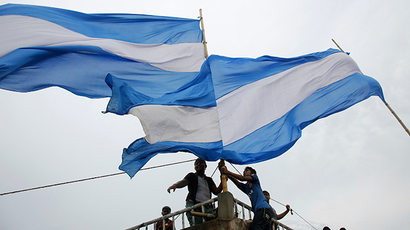Argentina blames US authorities for triggering default

Argentina has accused the US of judicial malpractice and threatened to take it to the International Court of Justice, as it allowed two small hedge funds drag Buenos Aires into default and made creditors and ordinary people suffer.
The majority of bond holders agreed to write-off two thirds of Argentina’s debt held since it defaulted in 2001-2002. However a group of hedge funds, or as Argentina calls them "vulture fund" investors, who did not agree to the write-off, are now insisting on full payment of all the debt.
The problem arose after the US court prevented Argentina paying $539 million to its creditors, saying it should first pay $1.5 billion to compensate those investors who never accepted the restructuring deal.
The deadline set to by the US judge to pay the debt expired on Thursday at 04:00 GMT after which the US court froze Argentina’s payments to other bond holders, pushing the country into a technical default.
“To say that Argentina is in technical default is a ridiculous hoax,” the Daily Telegraph quotes Jorge Capitanich, Argentina’s cabinet chief, accusing Judge Griesa of acting as an “agent” of speculative funds. “There’s been mala praxis here by the US justice system, for which all three branches of the government are responsible. Argentina has tried to negotiate in good faith,” he added.
Argentina has threatened to take the US to the International Court of Justice for judicial malpractice.
After the deadline Standard & Poor’s immediately declared the country to be in “selective default” As a result, the most important index of the Buenos Aires Stock Exchange, the MERVAL, fell 7 percent as Argentina’s banks plunged by 12 percent. Even the US Dow Jones Industrial Average fell by 1.6 percent in late trading.
READ MORE: Argentina placed into ‘default’ rating as debt deal deadline expires
However Argentina's President Christina Kirchner denies the country is in financial default, stressing that it still has opportunities to compromise with international debt holders.
The latest default is expected to exacerbate Argentina's economy already hit by recession, analysts say. However they stress the effect will be easier than the economic meltdown 13 years ago when savers' accounts were frozen to stop a run on the banks, and dozens died in violent street protests.
"The full consequences of default are not predictable, but they certainly are not positive," the BBC quotes Daniel Pollack, the court-appointed mediator in the case.














